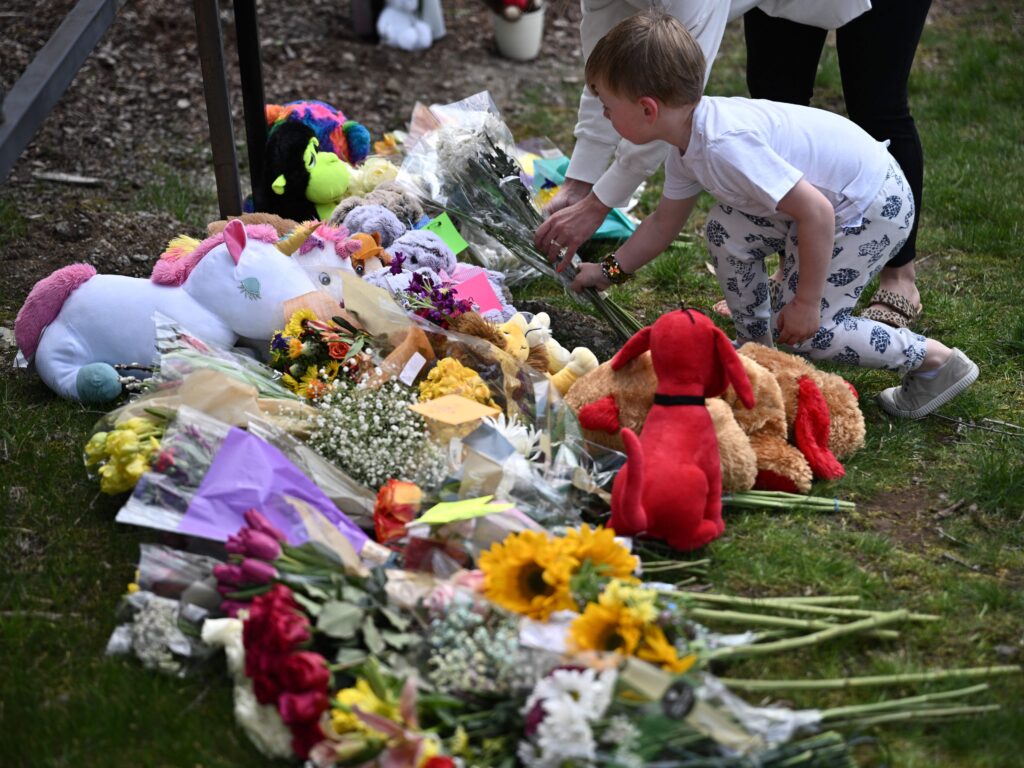
The morning of March 27, 2023, I sat in the newsroom with one hand over my mouth in shock and the other scrolling on my computer. The Washington Post had just published an article called The Blast Effect: This is how bullets from an AR-15 blow the body apart.
The visuals were horrifying – examining the utter destruction wrought by a piece of metal entering a body and shattering into ruinous fragments.
I remember pausing on a photo of Noah Pozner, 6, who was killed at Sandy Hook Elementary School. He was a little boy dressed up in a Batman suit, looking small but brave in a superhero kind of way, with a smile peeking out behind his mask.
That image preceded a graphic of how Noah was shot three times with an automatic-style weapon. Once in his tiny hand, mangling it. Another time through his back, filling his lungs with blood. And a final time through his perfectly innocent face.
The contrast of those images brought me to tears.
Less than an hour later, we learned that the school shooting epidemic had struck close to home. In a few more hours we’d learn that three 9-year-old children had been killed by an intruder armed with two automatic-style weapons and a handgun.
And I could visualize the damage and destruction that those bullets had done to their bodies.
In my reporting, I often hear the phrase, “Guns don’t kill people, people kill people.” Since the Covenant school shooting, Tennessee has not enacted any new laws to separate those people from their guns when they pose a threat. If someone today was concerned about their loved one becoming the next mass shooter, they would have the same limited options they did a year ago.
More: How Tennessee became one of the most gun-friendly states before the Covenant School shooting
The three guns used at Covenant — along with four others hidden at home — were all obtained legally. The assailant bought them from five different gun stores, stockpiling weapons over the course of about two years, the police said.
His parents, who he lived with, did not believe he should own any weapons because of his mental health. But Tennessee does not have a law that would prevent someone like that from buying guns. He didn’t have a prior record, and had not been deemed mentally ill by a court.
His parents thought he only had one gun, the police said. They thought maybe he had sold it. And neither they, nor law enforcement, could have known otherwise — Tennessee doesn’t have a registry of firearms, so it’s impossible to know how many guns a person has.
In a press conference in the wake of the shooting, Nashville’s police Chief John Drake said the department “would have tried to get those weapons” if a threat had been reported.
But Drake didn’t say how. So I asked.
The department’s answer?
The police could have gotten the weapons if he had offered them to the department voluntarily.
At the time, the police had no other options.
A year after Covenant, they still don’t.
 BRENDAN SMIALOWSKI AFP via Getty Images
BRENDAN SMIALOWSKI AFP via Getty ImagesA boy leaves flowers at a makeshift memorial for victims by the Covenant School building.
The state of Tennessee is no stranger to gun violence. We have some of the highest rates in the nation. Guns are the leading cause of death for children in Tennessee. And Tennessee is one of the most dangerous states for women killed by men.
But no law can pass through the Tennessee legislature without the support of the state’s Republican supermajority, which hasn’t taken up gun restrictions. That is not because lawmakers are receiving big donations from groups like the National Rifle Association — instead, it’s because of the way those lobbying groups throw their weight around if a Republican steps “out of line” on guns.
Take for example the case of Debra Maggart. Maggart was a Republican representative and a lifelong member of the NRA. But in 2012, she declined to support a bill that would later be known as “guns in trunks,” that allowed gun owners to treat their car like an extension of their home when it came to carrying. When Maggart’s primary race came up, the NRA spent thousands of dollars on ads against her, and she lost her seat.
The story is close to a fable now — lawmakers don’t want to get “Maggart-ed.”
Guns are a line the party won’t cross. Even when Tennessee’s Republican governor called on legislators to pass gun reform after Covenant, they didn’t. Last summer’s special session on public safety came and went without any gun reform measures being passed.
More: How Tennessee’s justice system allows dangerous people to keep guns — with deadly outcomes
Beyond the NRA, Tennessee’s most powerful gun lobbying groups won’t support any gun measure that doesn’t live up to the Supreme Court’s decision in the Bruen case — essentially, any new law would have to be consistent with gun laws from the time the Second Amendment was ratified. That was in 1791, long before guns were the most common murder weapon in the United States.
Meanwhile, the stalemate at the state capitol is growing more and more at odds with the desires of Tennesseans — especially after Covenant. A statewide poll showed the majority of participants were in favor of more background checks and even an extreme risk protection law, commonly known as a red flag law, that could have prevented the Covenant shooter from having access to guns.
But Tennessee’s laws are largely not designed to prevent gun violence. Instead, they are designed to protect gun rights. And in the wake of another tragedy, that has not changed.

